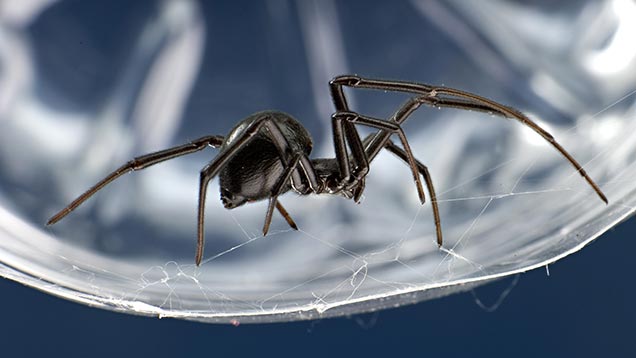Is spider venom the key to a bee-friendly pesticide?
 © Rex
© Rex The government has announced funding for a project to look at whether spider venom can be used to create a pesticide for wheat and oilseed rape which is effective on slugs or beetles but harmless to bees.
The project is one of six which will benefit from the second round of Agri-Tech Catalyst funding, Defra has revealed (24 December).
See also: Winning tenders for agri-tech funding revealed
Arch UK Biocides Limited in collaboration with the University of Durham, the Food and Research Agency (Fera) and I2LResearch Ltd, will receive over £650,000 of Agri-Tech Catalyst funding to develop an environmentally friendly pesticide which is harmless to non-target species including bees.
The idea is that venom peptides, known to be harmless to mammals, will be fused to a “carrier” protein that can then be applied to crops on a large scale.
When treated crops are eaten by pests, such as slugs or beetles, the “carrier” protein transports the spider toxin from the pests gut and into the nervous system, eradicating the threat without impacting on other species.
Universities, science, and cities minister Greg Clark said: “As much as a third of the food we consume is pollinated by bees and therefore addressing the threats they face is a very real challenge for society.
“I am pleased that the Agri-Tech catalyst is supporting innovative projects that can effect real change for the better. It is groundbreaking projects like these which are establishing the UK as a world leader in agriculture technology, innovation and sustainability.”
Environment minister Lord de Mauley added: “The development of a new bee-friendly pesticide is a great example of using science to protect our food production and our rural economy for the future.
Other projects which will receive funding include:
- Glasgow: Optimising the efficiency of beef farming by monitoring the feeding behaviour and growth of individual cows: £1.3m (£1,000,000 from Agri-Tech Catalyst and £350,000 from industry).
- Dunbia, Wales: Developing a new lamb grading system based on imaging technology to more accurately assess meat, with potential to drive lamb breeding strategies to meet consumer requirements: £890,000 (£470,000 from Agri-Tech Catalyst and £420,000 from industry).
- Billingham, North East: Decreasing food waste of tomato and pepper production by suspending ripening at optimum eating quality without using chemicals: £2.2m (£1.1m from Agri-Tech Catalyst and £1.1m from industry).
- Theale, Berkshire: Increasing oat yields by developing new tools for growers, including translation of sensor data from unmanned aircraft systems to optimise growing conditions: £1.9m (£1.3m from Agri-Tech Catalyst and £550,000 from industry).
- Uxbridge, London: Addressing the effects of climate change on blackcurrant production by assessing the use of treatments to combat warmer winters used in other crops: £890,000 (£680,000 from Agri-Tech Catalyst and £210,000 from industry).
